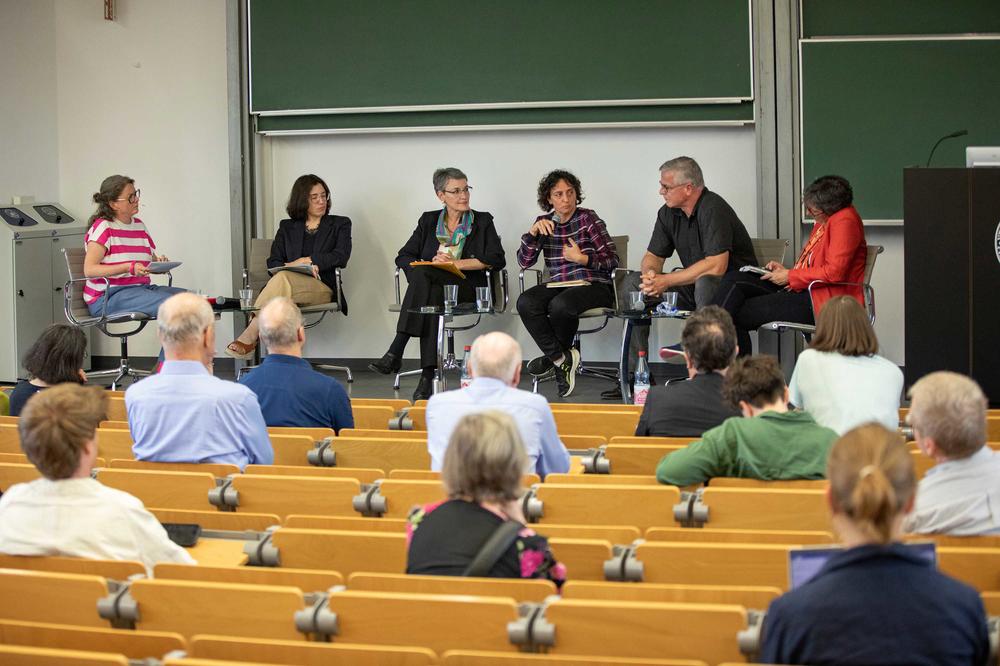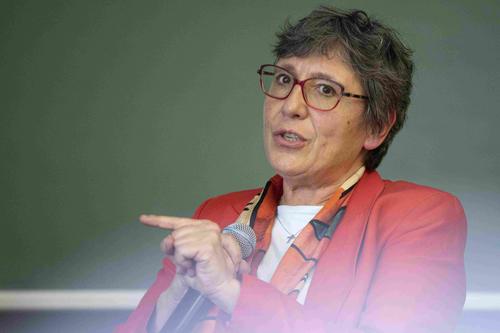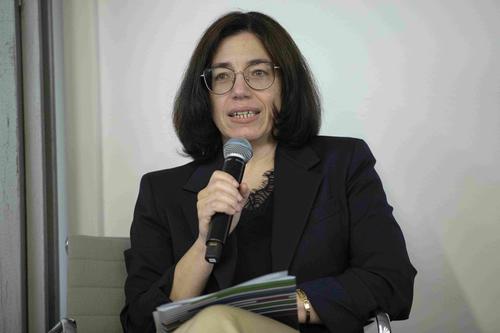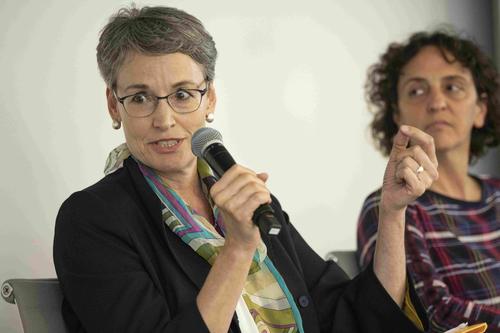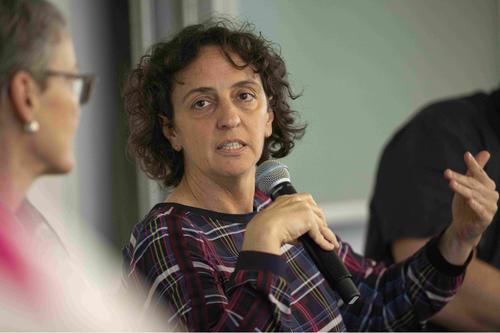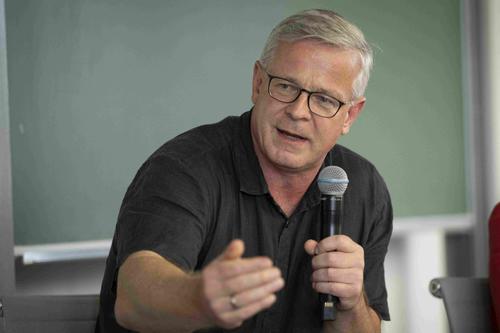“It is about the targeted humiliation of political opponents”
Semester Focus on Academic Freedom: SCRIPTS panel discussion “Flashpoint USA” held at Freie Universität Berlin
Aug 01, 2025
Discussing the situation at US universities: (from left to right) Moderator Katja Weber with panelists Lora Anne Viola, Kathrin Zippel, Rachel Tausendfreund, Mattias Kumm, and Tanja Börzel.
Image Credit: Christian Demarco
The Trump administration is now openly attacking American universities. On June 4, 2025, at Freie Universität Berlin, as part of the Semester Focus on Academic Freedom – a cooperative effort between Freie Universität Berlin, Humboldt-Universität zu Berlin, and SCRIPTS – researchers from the Cluster of Excellence “Contestations of the Liberal Script” (SCRIPTS) discussed the current situation of academic freedom in the USA, and which dangers are also looming in Germany.
Panelists included Professor Tanja Börzel of the Otto Suhr Institute at Freie Universität, political scientist and director of SCRIPTS; Professor Kathrin Zippel, sociologist at the Institute of Sociology, Freie Universität, and Principal Investigator at SCRIPTS; Professor Lora Anne Viola, political scientist at the John F. Kennedy Institute and Principal Investigator at SCRIPTS; Professor Mattias Kumm of the WZB Berlin Social Science Center and Principal Investigator at SCRIPTS; and Rachel Tausendfreund, German Council on Foreign Relations (DGAP).“Universities are the enemy” – J. D. Vance is quoted as saying in 2021 before he became the current vice president of the United States. Today, only a few months after Donald Trump’s second inauguration, the US government has started a war with its professed enemy. It has put severe pressure even on leading institutions like Harvard University to cut programs that promote diversity, equity, and inclusion. It has slashed research funding and launched schemes that stretch the law in order to harass foreign students. This political influence over research has created a climate of fear.
Professor Tanja Börzel, political scientist at the Otto Suhr Institute, Freie Universität Berlin, is director of the Cluster of Excellence SCRIPTS.
Image Credit: Christian Demarco
Professor Lora Anne Viola, political scientist at the John F. Kennedy Institute for North American Studies, Freie Universität Berlin, and PI at the Cluster of Excellence SCRIPTS.
Image Credit: Christian Demarco
“Critical thinking and a pluralistic culture of debate are taught at universities, and scientific research frequently reveals inconvenient or unsettling truths. This directly contradicts the image of society upheld by authoritarian populists,” says Tanja Börzel. “Academic freedom is a central pillar of liberal societies – and these days it is subject to massive pressure.”
Börzel opened the panel discussion that was part of the university’s Semester Focus on Academic Freedom with a welcome speech in which she also outlined the work of SCRIPTS. On May 22, 2025, the German Research Foundation announced that the Cluster of Excellence, which explores the causes and dynamics of the growing pressures on liberal democracies, had been awarded an additional seven years of funding under the German government’s Excellence Strategy. Research in the second funding period will concentrate on what makes democracies resilient.
“The mood on many campuses in the US is dark,” notes Lora Anne Viola, Professor for North American Foreign Policy at the John F. Kennedy Institute for North American Studies, Freie Universität Berlin, and SCRIPTS PI, who is also an American citizen. “The political pressure is palpable – the immigration police force, ICE, has officers on campuses.”
Kathrin Zippel, Einstein Professor of Sociology and Gender Studies at the Institute of Sociology, Freie Universität Berlin, and SCRIPTS PI has felt the pressure of the US administration herself. She taught and conducted research at Northeastern University in Boston for twenty years before she joined Freie Universität in 2022.
At the event, Zippel reported on her experiences in a National Science Foundation funded research project in the USA. “The National Science Foundation sent us an email announcing that we were no longer allowed to use funds previously approved, but this was rescinded a short time later,” she says. “Some universities demanded a commitment to no longer take any measures or actions in the area of diversity and inclusion.”
A Political, Cultural, and Economic Rupture in American Society
Kathrin Zippel, Einstein Professor at the Institute of Sociology, Freie Universität Berlin, and PI at SCRIPTS.
Image Credit: Christian Demarco
Rachel Tausendfreund, Senior Research Fellow of the German Council on Foreign Relations.
Image Credit: Christian Demarco
The panelists were mostly in agreement that a political, cultural, and economic rupture had opened in American society. “Universities like Harvard or Columbia are in fact the power centers of left-liberal America,” says Rachel Tausendfreund, Senior Research Fellow of the German Council on Foreign Relations (DGAP). “The Trump administration accuses the liberal elites of having no idea what life is like outside the large cities on the coasts. This criticism appears to be not completely unjustified.”
Lora Anne Viola notes that only about one percent of people in the US studies at an elite university. “An undergraduate education at Harvard costs up to 100,000 dollars per year,” she says. “Most people cannot even begin to afford this – and the democratic elites have failed to create more educational justice in recent years.”
Legal scholar Mattias Kumm, professor at New York University and the WZB Berlin Social Science Center and SCRIPTS member, emphasizes, however, that debates over conditions at universities and the aggressive methods of the Trump administration should be analyzed separately: “Self-criticism is part of this, and universities in particular should be places where we can discuss whether antidiscrimination measures have gone too far, or – on the contrary – not far enough,” he says. “But the current lawless actions of the US administration aimed at the targeted humiliation of political opponents have nothing to do with a serious discussion nor with conservatism.”
Is a Similar Scenario Conceivable in Germany?
Professor Mattias Kumm, constitutional rights scholar at the WZB Berlin Social Science Center and SCRIPTS PI.
Image Credit: Christian Demarco
Comparisons with German universities and the political developments in this country lay close at hand. Mattias Kumm warns that the higher education legislation in certain German states opens the door to political influence. “In some German states, the local state government can intervene in university affairs, for example, with the hiring process for professors,” he says.
Indeed, the Berlin Higher Education Act leaves room for this type of political sway. “We are therefore in discussions with the Berlin Senate about modernizing the laws governing professorial appointments in Berlin,” says Tanja Börzel.“In general, there is a fundamental trust in science in Germany, equally shared by politicians and the wider public, which works to our advantage.”
Strengthening Science Communication
To preserve and further strengthen this trust, science communication for a broad audience assumes an important role. It can help build bridges between the research world and society. Researchers must devote attention to explaining their work and the benefits of scholarship and science for the world beyond academia.
Many panel participants were skeptical as to whether increasing numbers of top international scholars would come to Germany due to political pressure in the USA, something that many German politicians hope for. German universities remain unable to offer comparable research conditions and salaries to prominent scholars, especially in light of current austerity measures.
“But this is not really about Germany preparing a safe haven for international stars,” says Lora Anne Viola. “The next generation of international scholars are the ones who are the most threatened. They need our solidarity the most.”
The original German version of this article appeared in campus.leben, the online magazine published by Freie Universität Berlin.
Further Information
The Academic Freedom Matters semester focus is a cooperative effort between Freie Universität Berlin, Humboldt-Universität zu Berlin, and the Cluster of Excellence SCRIPTS. In short essays, researchers of both universities illuminate aspects of academic freedom based on their expertise, while various panel discussions offer a forum to discuss specific issues.

